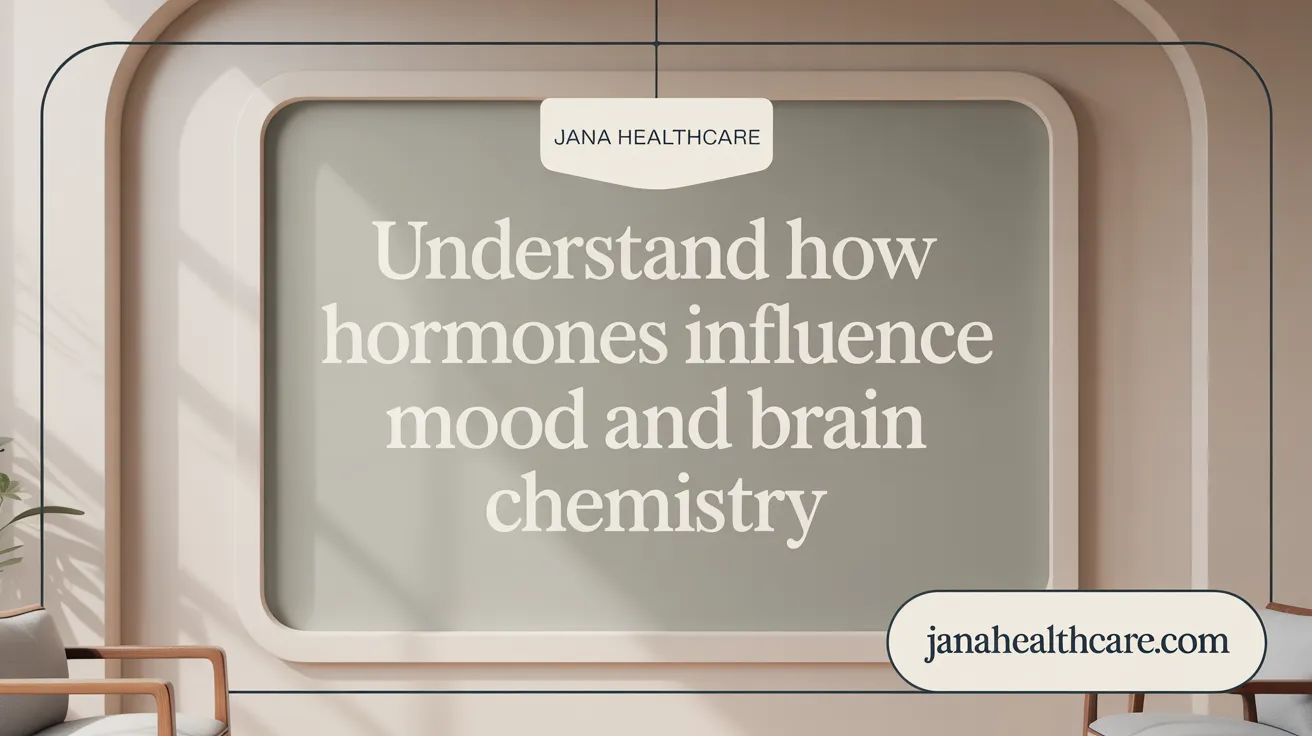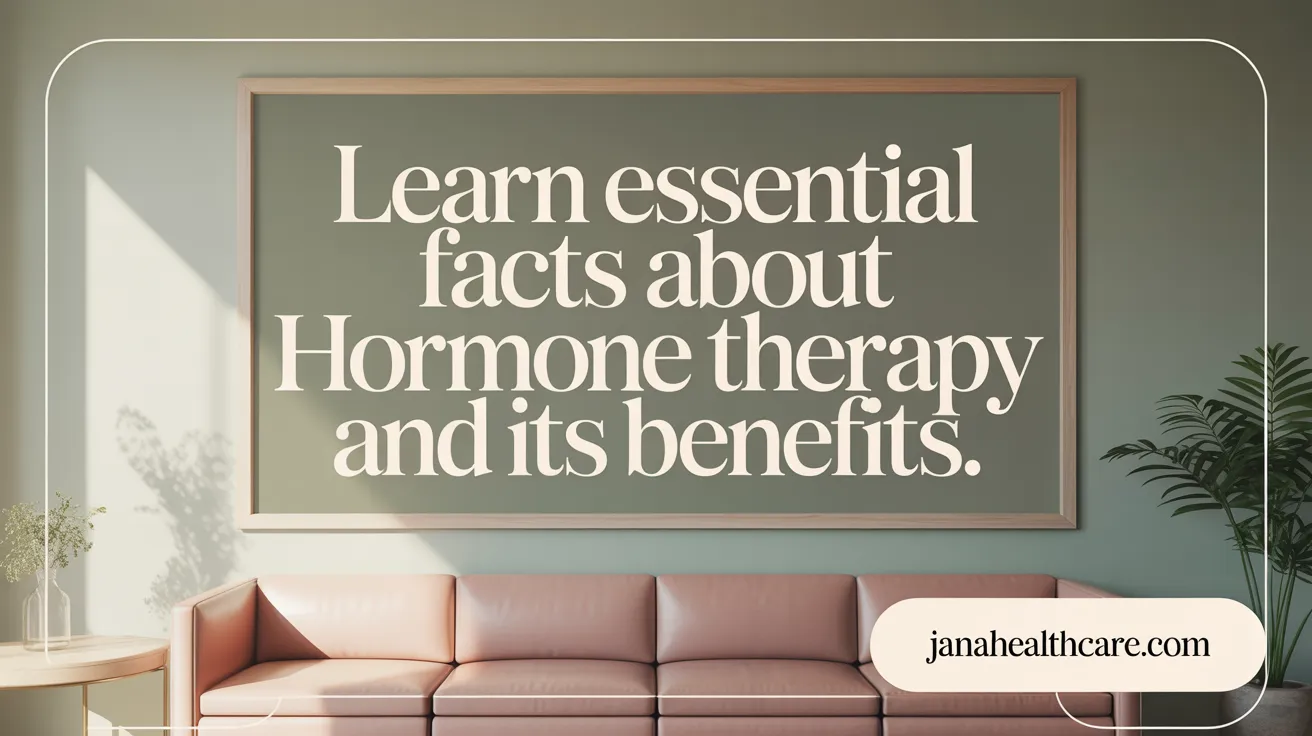Introduction to Hormones and Mood
Hormones and Their Impact on Mood and Emotional Health
Hormones are powerful chemical messengers that influence many aspects of our well-being, including mood and emotional health. Key hormones like estrogen, progesterone, and testosterone play an essential role in regulating brain chemistry and emotional balance.
The Importance of Hormonal Balance
Maintaining a healthy hormone balance is crucial for overall wellness. Fluctuations in hormone levels can lead to mood swings, irritability, anxiety, and depression. Women may experience these changes throughout various life stages such as puberty, pregnancy, perimenopause, and menopause, which can significantly impact their mental and emotional health.
Integrated Care for Enhanced Well-being
For patients seeking both medical and aesthetic care, understanding the connection between hormones and mood is vital. Personalized care plans that address hormonal balance not only improve emotional well-being but also contribute to enhanced quality of life and appearance. Combining medical expertise with a holistic approach supports optimal health and vitality at every age.
Recognizing Hormonal Imbalance: Signs and Symptoms

Typical causes of hormonal imbalance including life stages and health conditions
Hormonal imbalances occur naturally during life phases like puberty, pregnancy, perimenopause, and menopause. They also arise from medical conditions such as polycystic ovary syndrome (PCOS), thyroid disorders, Addison’s disease, and autoimmune diseases. Stress, medication use, and gland damage can further disrupt hormone levels. For more information, see Signs of hormonal imbalance and Hormonal Imbalance Causes.
Common symptoms linked to hormonal fluctuations such as mood disturbances, menstrual irregularities, skin and hair changes
Symptoms of imbalanced hormones vary widely but often include irregular or heavy menstrual periods, unexplained weight changes, hair thinning or loss, acne, and skin pigmentation issues. Mood swings, anxiety, depression, sleep disturbances, and sexual dysfunction are commonly reported. For women, fluctuations in estrogen and progesterone significantly influence emotional wellbeing and physical signs like hot flashes and vaginal dryness. Learn more about Hormones and Mood Connection and Hair and skin issues from hormonal imbalance.
Diagnostic procedures including lab tests and physical exams
Diagnosis typically involves reviewing medical history, thorough physical exams, and laboratory testing to measure hormone levels in blood. Additional evaluations may include ultrasound imaging and pelvic exams to identify underlying causes. Ongoing monitoring helps tailor treatments and track progress. For detailed guidance, see Diagnosing hormonal imbalance and Hormonal Imbalance Diagnosis.
Treatment options covering hormone therapy and natural remedies
Treatment depends on the specific imbalance and may include hormone replacement therapy (HRT), contraceptives, anti-androgen medications, or vaginal estrogen for localized symptoms. Lifestyle changes such as stress management, nutrition, exercise, and sleep hygiene support hormonal balance naturally. Consultation with healthcare providers is essential before starting any natural supplements or therapies to ensure safety and effectiveness. Explore more on Hormonal therapy options, Hormone replacement therapy in Brooklyn, and Hormonal therapy for cancer.
What medical and aesthetic services does Jana HealthCare offer?
Jana HealthCare in Brooklyn, NY, provides a comprehensive suite of medical and aesthetic services. Their integrated care approach combines modern medicine with cosmetic dermatology and wellness therapies tailored to enhance both health and appearance. Services include primary care, preventive health, cosmetic procedures, mental health support, and personalized treatments designed to promote overall well-being with an emphasis on holistic care. For more about integrated care, see Impact of Hormones on Health and Maimonides Menopause Center in Brooklyn.
The Complex Relationship Between Hormones and Mood

How Do Estrogen, Progesterone, and Testosterone Influence Mood and Brain Chemistry?
Hormones like estrogen, progesterone, and testosterone profoundly shape women's emotional well-being by regulating brain chemistry. Estrogen, for instance, increases serotonin levels and receptor sensitivity, boosting mood and emotional balance. Additionally, it modulates endorphin production—the natural "feel-good" chemicals—and protects nerve cells while encouraging nerve growth, supporting stable emotional health (Effects of Estrogen on Mood, Hormones Influencing Women's Mood).
How Do Hormonal Fluctuations During Life Stages Affect Mood?
Hormonal changes throughout the menstrual cycle, pregnancy, postpartum, perimenopause, and menopause impact mood in various ways. Drops in estrogen and progesterone before menstruation can trigger mood swings, irritability, and anxiety. Pregnancy's rising hormones often cause heightened emotional sensitivity, while postpartum estrogen declines may lead to postpartum depression. During perimenopause and menopause, erratic or falling estrogen levels correlate with increased mood disturbances, including irritability, anxiety, and depression (Hormonal fluctuations and symptoms, Hormonal Changes During Menopause, Premenstrual Syndrome (PMS) and Mood, Perimenopause mood disorders).
What Conditions Are Linked to Hormonal Mood Disturbances?
Several mood disorders are directly connected to hormonal shifts, such as:
- Premenstrual Syndrome (PMS): Affects up to 40% of women, causing irritability and mild depression before periods.
- Premenstrual Dysphoric Disorder (PMDD): A severe form of PMS affecting 3–9% of women, with intense mood swings and anxiety.
- Postpartum Depression: Occurs in 10–25% of women after childbirth due to rapid hormonal changes and other factors (Hormones Influencing Women's Mood, Estrogen and PMDD, Postpartum Mood Swings and Hormones.
In What Ways Does Estrogen Affect Emotional Health Through Brain Chemistry?
Estrogen enhances mood by increasing serotonin and its receptors, which regulate emotions. It also elevates endorphin levels, providing natural stress relief and happiness. Importantly, estrogen safeguards nerve cells from damage and promotes nerve growth, supporting stable neural pathways involved in mood regulation. These mechanisms help explain why fluctuating estrogen levels can produce notable emotional changes in women (Estrogen and Serotonin in the Brain, Neuroprotective Effects of Estrogen).
This understanding underscores the importance of personalized approaches for managing hormone-related mood disorders, combining clinical care, lifestyle strategies, and when appropriate, hormone therapy (Hormonal therapy options, Hormone Replacement Therapy (HRT) Benefits, Multidisciplinary care for hormonal mood symptoms, Integrative wellness therapies for hormonal health.
Managing Hormone-Related Mood Fluctuations

What lifestyle modifications can help balance mood related to hormonal changes?
Lifestyle plays a pivotal role in managing mood swings linked to hormonal imbalance symptoms. Key changes include adopting a balanced diet rich in nutrients that support hormonal health and brain function.
Regular exercise not only boosts endorphins but also stabilizes hormones, alleviating symptoms like irritability and anxiety. Stress management techniques such as mindfulness, meditation, and yoga are effective for reducing cortisol levels and enhancing emotional resilience.
Consistent, quality sleep hygiene is vital, as poor sleep exacerbates hormonal fluctuations and mood disorders. Collectively, these lifestyle strategies create a foundation for emotional well-being during phases like perimenopause mood disorders and menopause.
What medical interventions are available for hormone-related mood disorders?
Medical options complement lifestyle efforts and often include Hormone replacement therapy in Brooklyn, antidepressants, and counseling.
HRT can restore estrogen and progesterone balance, helping reduce symptoms such as mood swings, depression, and irritability, especially during perimenopause and menopause. Antidepressants may be prescribed when mood disturbances are severe or linked to conditions like premenstrual dysphoric disorder (PMDD).
Psychological counseling or therapy provides tools to cope with emotional changes, focusing on cognitive-behavioral techniques and support to improve mental health.
What are the safety, benefits, and timing considerations for hormone replacement therapy?
Starting HRT early in menopause—ideally within ten years of the last menstrual period—maximizes symptom relief and lowers risks. HRT benefits include alleviating hot flashes, sleep disturbances, low libido, and mood changes. Learn more about Hormone therapy for menopausal symptoms.
Side effects exist, such as a slight increased risk of blood clots, but these are generally low and individualized. Dosing is carefully adjusted for optimal effects with follow-ups to monitor progress and side effects.
The decision to pursue HRT should be tailored, weighing personal health history and preferences in consultation with a healthcare provider.
What support services are available in Brooklyn for managing hormone-related mood symptoms?
Brooklyn offers multidisciplinary care through centers like the Maimonides Menopause Center in Brooklyn, combining gynecological, psychiatric, and counseling services under one roof.
These clinics provide personalized treatment plans including hormone therapy, mental health support, lifestyle coaching, and comprehensive wellness services.
For those seeking holistic approaches, facilities such as Jana HealthCare offer Integrative wellness therapies for hormonal health. They focus on mindfulness, meditation, trauma-informed counseling, along with lifestyle guidance on nutrition, sleep, and stress management, addressing the whole person for sustained mental and emotional balance.
This collaborative and personalized approach equips women to navigate hormonal mood fluctuations with professional and empathetic care tailored to their unique needs.
Hormone Therapy: What Patients Should Understand

What Is Hormonal Therapy and How Is It Used?
Hormonal therapy is a treatment designed to manage conditions influenced by hormonal imbalance symptoms. It is frequently used to relieve menopausal symptoms such as hot flashes, night sweats, vaginal dryness, sleep disturbances, and mood swings. Additionally, hormonal therapy plays a role in treating certain hormone-driven cancers by blocking or removing hormones that fuel tumor growth. For more details, see Hormonal therapy treatment overview.
What Types of Hormone Therapy Are Available?
Hormone therapy comes in various forms to suit individual needs and preferences. Common administration methods include:
- Estrogen creams and vaginal rings for localized symptom relief (Estrogen creams and vaginal rings)
- Oral tablets and skin patches for systemic effects
- Implanted hormone pellets that provide a slow and steady hormone release
This range allows personalized treatment plans tailored to symptom severity and patient lifestyle. Learn more about the Hormone therapy treatment process.
What Are Common Side Effects and Why Is Monitoring Important?
While hormone therapy brings many benefits, it may cause side effects such as hot flashes, fatigue, and sexual dysfunction. Since responses can vary, ongoing monitoring through regular healthcare visits is vital. Patients should report any new symptoms or concerns promptly to ensure safety and optimize therapy. Additional information on Side effects of hormonal therapy and Monitoring hormonal therapy is available.
Why Are Individualized Treatment Plans Crucial?
Hormone therapy is not one-size-fits-all. Dosage and duration should be customized based on medical history, symptom severity, and health risks. Typically, treatments start at a low dose with follow-up appointments around three months later to adjust as needed. Shared decision-making between the patient and healthcare provider supports the best outcomes and ensures that treatment aligns with personal health goals and quality of life improvements. For insights into Preparation for hormonal therapy and Follow-up after hormonal therapy, see the referenced resources.
Integrating Hormonal Health into Comprehensive Care
How can holistic approaches combine clinical care, aesthetic treatments, and wellness therapies?
Hormonal health is complex, affecting mood, metabolism, skin, and sexual function. Integrating clinical care with aesthetic and wellness therapies addresses these diverse needs comprehensively. For example, hormone replacement therapy (HRT) can manage menopausal symptoms like hot flashes and mood swings, while aesthetic treatments can improve skin quality affected by hormonal shifts. Complementary wellness therapies—such as nutrition counseling, stress management, and exercise programs—support hormonal balance and overall vitality. For more on managing signs of hormonal imbalance, see this resource.
What role do multidisciplinary teams play in hormone health and overall wellness?
Multidisciplinary teams, including endocrinologists, gynecologists, psychiatrists, nutritionists, and aesthetic practitioners, provide coordinated care tailored to each patient’s hormonal profile and lifestyle. Such collaboration ensures that mood disorders linked to hormonal fluctuations, physical symptoms, and aesthetic concerns are addressed simultaneously. In Brooklyn, specialized centers like the Maimonides Menopause Center exemplify this model by offering expert hormone therapy alongside mental health support and lifestyle recommendations. For a deeper look at multidisciplinary care for hormonal mood symptoms and the connection between hormones and women's mood, consult these detailed discussions.
How does patient empowerment through education and personalized care plans improve outcomes?
Educating patients about hormone function, symptoms of imbalances, and treatment options fosters informed decision-making. Personalized care plans consider individual hormone levels, symptom severity, and personal goals, creating trust and adherence. Patients gain confidence managing mood swings, weight changes, and skin concerns, enhancing quality of life. Regular follow-ups allow adjustments, ensuring treatments evolve with changing needs. Resources on diagnosing hormonal imbalance and questions about hormonal therapy can support patient education.
Why is this integrated approach relevant for multidisciplinary practices like Jana HealthCare in Brooklyn, NY?
In urban centers like Brooklyn, busy lifestyles and stress can exacerbate hormonal imbalances. Practices such as Jana HealthCare benefit from integrating medical, aesthetic, and wellness services to provide comprehensive, accessible care. By blending clinical treatment with holistic support, patients receive well-rounded care addressing both the science of hormones and the art of wellbeing, empowering women through all life stages. Additional insight into the impact of hormones on health across ages may be helpful.
Empowering Patients: Key Questions to Ask Your Doctor About Hormones and Mood
Understanding the Impact of Hormones on Mood
Hormonal changes, including fluctuations in estrogen, progesterone, and testosterone, significantly influence mood and emotional health. Recognizing these effects helps patients appreciate the connection between hormones and symptoms like anxiety, irritability, or depression.
Asking the Right Questions
Patients should feel empowered to ask their healthcare providers about hormone levels, potential imbalances, and treatment options. Inquiring about the causes behind mood shifts, available diagnostic tests, and personalized care plans encourages comprehensive management.
Exploring Treatment and Support
Treatment options range from lifestyle adjustments—such as diet, exercise, and stress management—to medical therapies like hormone replacement therapy (HRT), counseling, or medications. A holistic approach ensures care is tailored to individual needs, enhancing overall well-being and quality of life.
